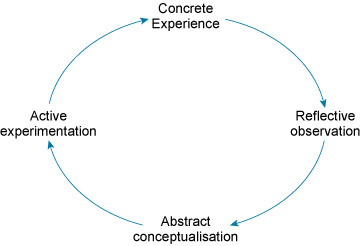4 Supporting learning in coaching and mentoring
Coaching and mentoring work within a constructivist paradigm. Constructivists emphasise the uniqueness of each learning experience as individuals develop meaning through their own interactions with the environment. In line with this, coaching and mentoring encourages a learner- or client-centred approach. Thus, coaching and mentoring as a learning methodology differs from teaching and training, as the coach often facilitates non-directive and non-judgemental sessions, thereby encouraging the individual to find their own answers. The learner is encouraged to find their own way towards new knowledge and skills; so, instead of ‘telling’ the learner the answers, learning is facilitated through a cycle of experience and reflection.
Reflective learning in coaching and mentoring
The experiential learning cycle (Kolb 1984) in Figure 5 below shows how a learner’s actions and experience can be explored through reflection, which can lead to changed thinking and behaviours. If the learner is encouraged to explore a range of theoretical perspectives and practical applications, they may decide to act differently, which will inform future reflection.
Reflection plays a key part in learning and will appear frequently in a coaching relationship for both coach and coachee. You may want to log your reflections as you study this course, and as you carry out personal development planning and skills development. This may be particularly useful in relation to Section 5, as it has a more applied focus.

